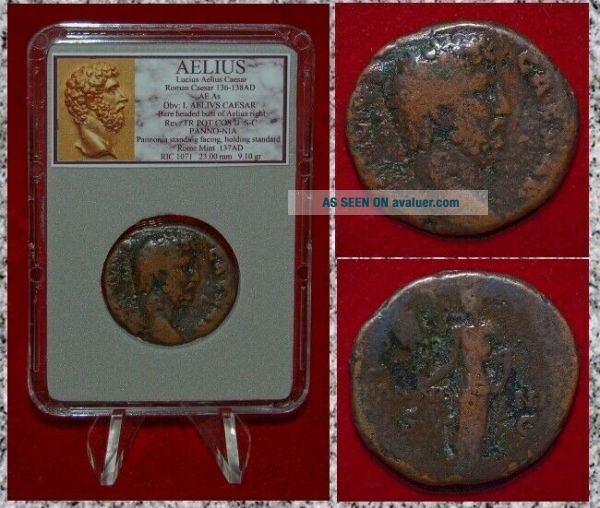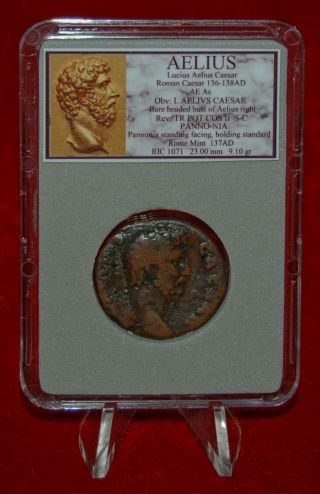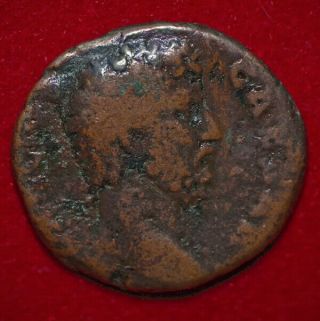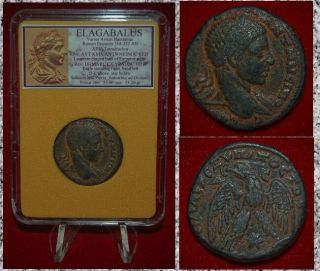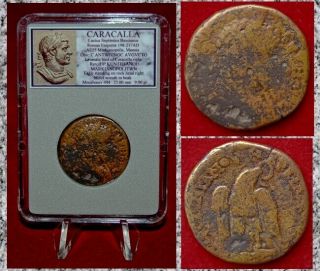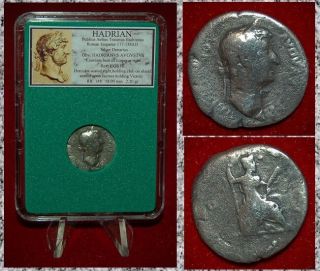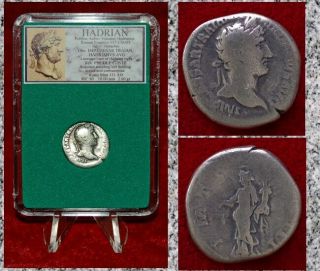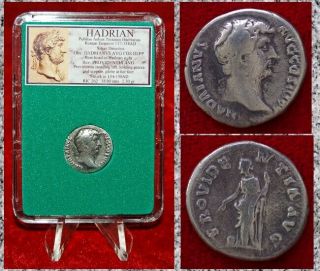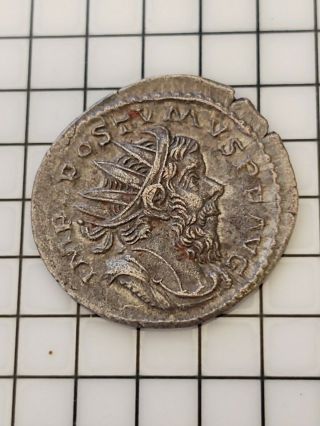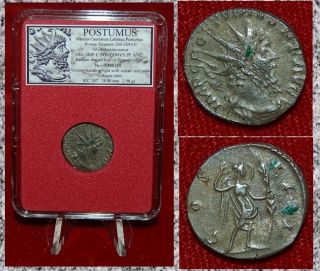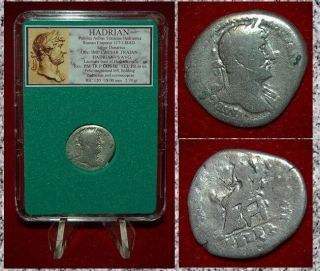Ancient Roman Empire Coin AELIUS Pannonia On Reverse Bronze As
Item History & Price
| Reference Number: Avaluer:36947872 | Composition: Bronze |
| Denomination: As | Ruler: Aelius |
ROMAN EMPIREAncient CoinAE As
OfAELIUSLucius Aelius CaesarRoman Caesar: 136-138 AD Obv: L AELIVS CAESAR Bare head bust of Aelius right Rev: TR POT COS II PANNONIA S-C
Pannonia standing facing, holding standard 23.00 mm
PRIVATE ANCIENT COINS COLLECTION SOUTH FLORIDA ESTATE&...nbsp; SALE
( Please, check out other ancient coins we have available for sale. We are offering 1000+ ancient coins collection)
ALL COINS ARE GENUINE LIFETIME GUARANTEEAND PROFESSIONALLY ATTRIBUTEDThe attribution label is printed on archival museum quality paper
An interesting bronze coin of Aelius. Bust of Aelius on obverse and Pannonia on reverse. The coin comes with display case, stand and attribution label printed on museum quality paper attached as pictured. A great way to display an ancient coins collection. You are welcome to ask any questions prior buying or bidding. We can ship it anywhere within continental U.S. for a flat rate of 6.90$. It includes shipping, delivery confirmation and packaging material.
Limited Time Offer:FREE SHIPPING(only within the continental U.S.)The residents of HI/AK/U.S. Territories and International bidders/buyers must contact us for the shipping quote before bidding/buying
AELIUSLucius Aelius Caesar (January 13, 101 – January 1, 138) became the adopted son and intended successor of Roman Emperor Hadrian (January 24, 76 AD – July 10, 138 AD), but never attained the throne. Aelius was born with the name Lucius Ceionius Commodus, and later called Lucius Aelius Caesar. He is often mistakenly referred to as Lucius Aelius Verus, though this name is not attested outside the Augustan History and probably arose as a manuscript error.
Life and familyThe young Lucius Ceionius Commodus was of the gens Ceionia. His father, also named Lucius Ceionius Commodus (the author of the Augustan History adds the cognomen Verus), was consul in 106, and his paternal grandfather, also of the same name, was consul in 78. His paternal ancestors were from Etruria, and were of consular rank. His mother was a Roman woman called Fundania Plautia. The Augustan History states that his maternal grandfather and his maternal ancestors were of consular rank.Before 130, Lucius Commodus married Avidia Plautia, a well-connected Roman noblewoman who was the daughter of the senator Gaius Avidius Nigrinus. Plautia bore Lucius two sons and two daughters, who were:Lucius Ceionius Commodus the Younger – He would become Lucius Verus, and would co-rule as Roman Emperor with Marcus Aurelius from 161 until his own death in 169. Verus would marry Lucilla, the second daughter of Marcus Aurelius and Faustina the Younger. Gaius Avidius Ceionius Commodus – he is known from an inscription found in Rome. Ceionia Fabia – at the time of Marcus Aurelius's adoption, she was betrothed, as part of the adoption conditions, to him. Shortly after Antoninus Pius' ascension, Pius came to Aurelius and asked him to end his engagement to Fabia, instead marrying Antoninus Pius’ daughter Faustina the Younger; Faustina had originally been planned by Hadrian to wed Lucius Verus. Ceionia Plautia
Heir to HadrianFor a long time, the emperor Hadrian had considered Lucius Julius Ursus Servianus as his unofficial successor. As Hadrian's reign drew to a close, however, he changed his mind. Although the emperor certainly thought Servianus capable of ruling as an emperor after Hadrian's own death, Servianus, by now in his nineties, was clearly too old for the position. Hadrian's attentions turned to Servianus' grandson, Gnaeus Pedanius Fuscus Salinator II. Hadrian promoted the young Salinator, his great-nephew, gave him special status in his court, and groomed him as his heir. Servianus, who always cherished the idea that his youthful grandson would one day succeed his brother-in-law, was overjoyed.However, in late 136, Hadrian almost died from a haemorrhage. Convalescent in his villa at Tivoli, he decided to change his mind, and selected Lucius Ceionius Commodus as his new successor, adopting him as his son. The selection was done invitis omnibus, "against the wishes of everyone"; in particular, Servianus and the young Salinator became very angry at Hadrian and wished to challenge him over the adoption. Even today, the rationale for Hadrian's sudden switch is still unclear. It is possible Salinator went so far as to attempt a coup against Hadrian in which Servianus was implicated. In order to avoid any potential conflict in the succession, Hadrian ordered the deaths of Salinator and Servianus.Although Lucius had no military experience, he had served as a senator, and had powerful political connections; however, he was in poor health. As part of his adoption, Lucius Ceionius Commodus took the name Lucius Aelius Caesar.
DeathAfter a year's stationing on the Danube frontier, Aelius returned to Rome to make an address to the senate on the first day of 138. The night before the speech, however, he grew ill, and died of a haemorrhage late the next day. On 24 January 138, Hadrian selected Aurelius Antoninus (September 19, 86 – March 7, 161) as his new successor.After a few days' consideration, Antoninus accepted. He was adopted on 25 February. As part of Hadrian's terms, Antoninus adopted both Lucius Aelius's son (properly called Lucius Ceionius Commodus the Younger) and Hadrian's great-nephew by marriage, Marcus Aurelius (April 26, 121 – March 17, 180). Marcus became M. Aelius Aurelius Verus; Lucius became L. Aelius Aurelius Commodus. At Hadrian's request, Antoninus' daughter Faustina was betrothed to Lucius.
SourcesThe major sources for the life of Aelius are patchy and frequently unreliable. The most important group of sources, the biographies contained in the Historia Augusta, claim to be written by a group of authors at the turn of the 4th century, but are in fact written by a single author (referred to here as "the biographer") from the later 4th century (c. 395).The later biographies and the biographies of subordinate emperors and usurpers are a tissue of lies and fiction, but the earlier biographies, derived primarily from now-lost earlier sources (Marius Maximus or Ignotus), are much more accurate. For Aelius, the biographies of Hadrian, Antoninus Pius, Marcus and Lucius Verus are largely reliable, but that of Avidius Cassius, and even Lucius Aelius' own, is full of fiction.Some other literary sources provide specific detail: the writings of the physician Galen on the habits of the Antonine elite, the orations of Aelius Aristides on the temper of the times, and the constitutions preserved in the Digest and Codex Justinianus on Marcus' legal work. Inscriptions and coin finds supplement the literary sources.Marcus Aurelius later co-ruled with Lucius Verus as joint Roman Emperors, until Lucius Verus died in 169, after which Aurelius was sole ruler until his own death in 180.
SHIPPING INFO: - The Shipping Charge is a flat rate and it includes postage, delivery confirmation, insurance up to the value (if specified), shipping box (from 0.99$ to 5.99$ depends on a size) and packaging material (bubble wrap, wrapping paper, foam if needed)
- We can ship this item to all continental states. Please, contact us for shipping charges to Hawaii and Alaska.
- We can make special delivery arrangements to Canada, Australia and Western Europe.
- USPS (United States Postal Service) is the courier used for ALL shipping.
- Delivery confirmation is included in all U.S. shipping charges. (No Exceptions)
CONTACT/PAYMENT INFO:
- We will reply to questions & comments as quickly as we possibly can, usually within a day.
- Please ask any questions prior to placing bids.
- Acceptable form of payment is PayPal
REFUND INFO:
- All items we list are guaranteed authentic or your money back.
- Please note that slight variations in color are to be expected due to camera, computer screen and color pixels and is not a qualification for refund.
- Shipping fees are not refunded.
FEEDBACK INFO:
- Feedback is a critical issue to both buyers and sellers on eBay.
- If you have a problem with your item please refrain from leaving negative or neutral feedback until you have made contact and given a fair chance to rectify the situation.
- As always, every effort is made to ensure that your shopping experience meets or exceeds your expectations.
- Feedback is an important aspect of eBay. Your positive feedback is greatly appreciated!



